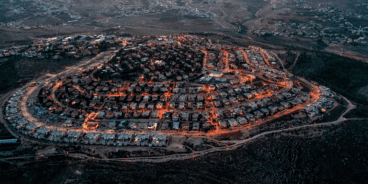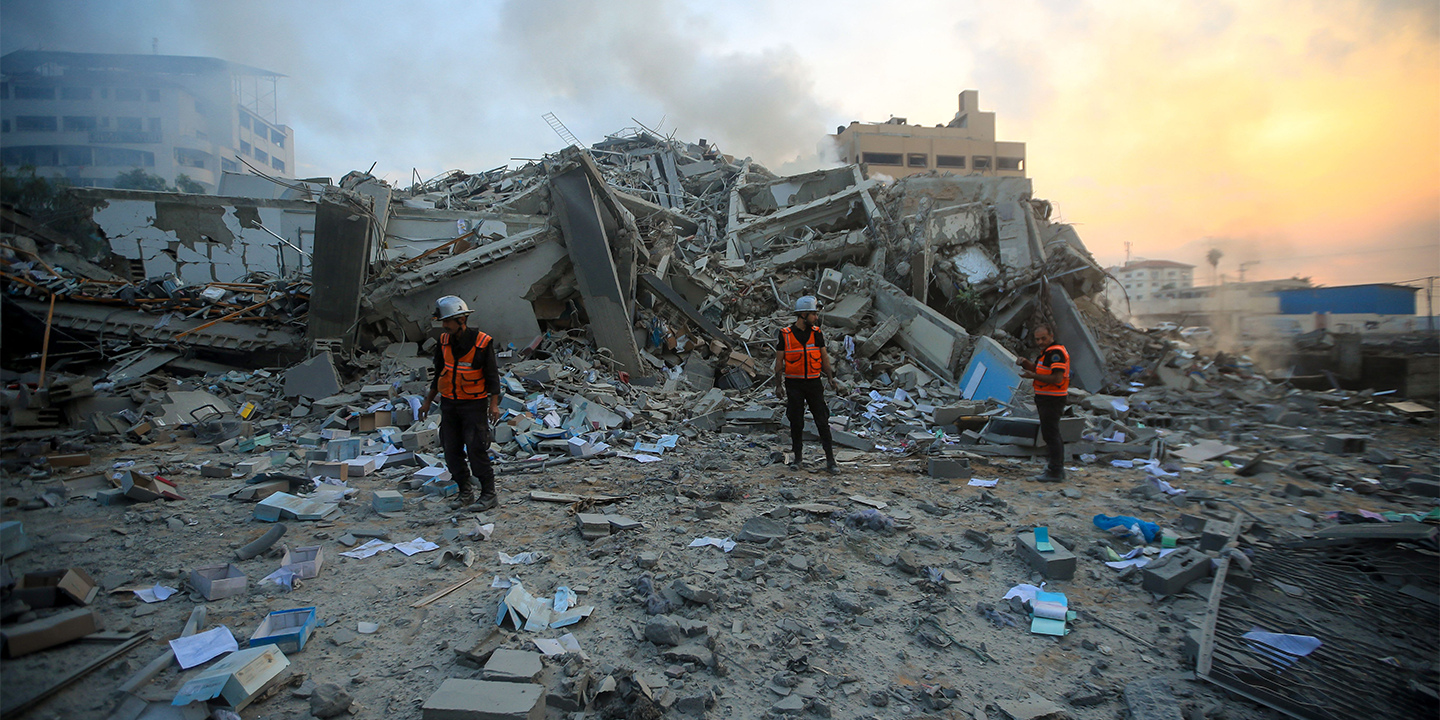

Atrocity Alert No. 368: Israel and the Occupied Palestinian Territory, Haiti and Ethiopia
Atrocity Alert is a weekly publication by the Global Centre for the Responsibility to Protect highlighting situations where populations are at risk of, or are enduring, mass atrocity crimes.
CIVILIANS IN ISRAEL AND GAZA SUFFER AS PARTIES TO THE CONFLICT PERPETRATE ATROCITIES
On 7 October Hamas and other Palestinian armed groups launched a coordinated deadly assault into Israel, attacking towns, kibbutzim, other civilian areas and roads across multiple border areas. Civilian homes were invaded and set fire to, and videos on social media have shown militants kidnapping entire families – including women, children and elderly people – and parading them through the streets of Gaza. The militants perpetrated grave human right violations, killing at least 1,000 Israelis and injuring over 2,800. Between 50 and 100 people, including Israeli and foreign civilians, as well as members of the Israeli security forces, have been captured and forcibly taken into Gaza as hostages. Hamas and the Palestinian Islamic Jihad have also fired thousands of indiscriminate rockets into Israel.
In response, Israeli Defense Forces have launched heavy airstrikes into the blockaded Gaza Strip and conducted ground operations against Hamas militants. During an address to Israel on 7 October, Israeli Prime Minister Benjamin Netanyahu asserted, “I say to the residents of Gaza: Leave now because we will operate forcefully everywhere.” Israeli airstrikes have hit civilian objects, including multi-storied residential buildings, medical facilities, mosques, water and sanitation facilities and refugee and displacement camps. According to the Ministry of Health in Gaza, over 900 Palestinians have been killed and more than 4,250 injured, including many children. Over 263,934 civilians have been displaced in Gaza so far. Palestinians are trapped in Gaza, with the only available crossing into Israel – the Beit Hanoun Crossing (or the Erez Crossing) – closed by Israeli authorities. The other remaining route, the Rafah Crossing into Egypt, was forced to shut down after being targeted by Israeli airstrikes.
On 9 October Israeli Defense Minister Yoav Gallant said he ordered a complete siege on Gaza, stating, “There will be no electricity, no food, no fuel, everything is closed. We are fighting human animals and we act accordingly.” While Israel has already imposed an air, sea and land blockade of Gaza since 2007, leaving over 2.3 million Palestinians to live without sufficient access to goods and services essential to their survival, such a siege further jeopardizes the flow of humanitarian relief and vital services and supplies. Punitive measures – such as the imposition of sieges that endanger the lives of civilians by depriving them of goods essential for their survival – amounts to the war crime of collective punishment.
UN Secretary-General António Guterres stressed, “This most recent violence does not come in a vacuum. The reality is that it grows out of a long-standing conflict, with a 56-year long occupation and no political end in sight.” Recent years have seen escalating violent Israeli raids and illegal settlement expansion in the Occupied West Bank – in just the first nine months of 2023, Israeli authorities killed the highest number of Palestinians in the Occupied West Bank since 2005. Hamas has also fired rockets, mortars and incendiary balloons into Israel. The violence is also occurring in the context of a two-tiered legal and political system imposed by Israel that experts have recognized as satisfying the prevailing evidentiary standard for the crime of apartheid. Under international law, perpetual occupation and settlement expansion are war crimes while the crime of apartheid is a crime against humanity.
International law obligations are not optional or selective and apply to all parties to a conflict, even when hostilities are retaliatory or undertaken in self-defense. Israelis and Palestinians equally deserve to live in safety, with dignity and full access to all human rights. The deliberate targeting of civilians, indiscriminate attacks, abduction of civilians and hostage-taking are prohibited by International Humanitarian Law (IHL) and may amount to war crimes. Israeli forces, as well as Hamas and other Palestinian armed groups, must strictly adhere to IHL and ensure all civilians and civilian objects are protected. All individuals taken hostage must be released immediately, safely and unconditionally. Statements of support from third parties regarding Israel’s right to self-defense must also urge Israel to abide by international law obligations and acknowledge the equal importance of the safety, rights and dignity of all populations, including Palestinians in Gaza. All parties must refrain from propagating dehumanizing rhetoric and hate speech to avoid further inflaming divisions.
The International Criminal Court should accelerate its investigation into all likely war crimes and crimes against humanity perpetrated by all parties, before and during the latest hostilities. The root causes of deadly cycles of violence and atrocities must be addressed, including ending Israel’s blockade on Gaza, illegal occupation and settlement-related activity and apartheid policies. So long as impunity remains unchecked, violence against civilians and needless suffering will continue.
UN SECURITY COUNCIL AUTHORIZES NEW MULTINATIONAL SECURITY MISSION TO HAITI
On 2 October the UN Security Council authorized a new international security mission to Haiti with the aim of stemming unprecedented gang violence and re-establishing security in the country. The Multinational Security Support (MSS) mission to Haiti has a two-fold mandate, including providing operational support to the Haitian National Police (HNP) to counter gangs and to protect critical infrastructure sites, such as airports, ports, schools, hospitals and key intersections. The MSS will also help ensure unhindered and safe access to humanitarian aid, as millions of vulnerable Haitians have little or no access to basic necessities due to gangs blocking essential transport routes and looting humanitarian supplies.
The authorization of the MSS follows more than a year of requests by Haitian Prime Minister Ariel Henry in response to intensifying insecurity and human rights violations perpetrated by powerful and predatory armed gangs. The surging violence is fueled in part by a power vacuum created since the assassination of then-President Jovenel Moïse in July 2021. The UN has estimated that armed gangs, who are competing for control of strategic resources, now control nearly 90 percent of the capital, Port-au-Prince. Amidst growing insecurity, the HNP has lacked the capacity to combat their territorial expansion and protect residents.
While addressing the UN Human Rights Council on 10 October, Nada Al-Nashif, Deputy High Commissioner for Human Rights, emphasized that, “Gangs are threatening the authority of the State at an unprecedented scale…with brutal attacks committed against the population, including killings, mutilations, and kidnappings. This is happening with complete impunity, destroying any prospect for stability.” From 1 January and 30 September 2023 gang related violence resulted in 3,156 killings and 1,284 kidnappings, a sharp increase compared to the same period last year.
In recent months violence has spread to all communes in the metropolitan area of Port-au-Prince and beyond to the Artibonite region. According to the UN Children’s Fund, between May and June at least 60 people were killed or injured amid clashes for territory and resources in Artibonite compared with four during the same period last year. Nearly half of the 298 kidnappings documented across the country during this period occurred in Bas Artibonite (lower part of Artibonite) and primarily involved civilians. In one incident, 15 women heading to a market were reportedly kidnapped and raped.
There is not yet an official timeline for the deployment of the Kenyan-led force. On 9 October a Kenyan court temporarily blocked the deployment of police personnel to Haiti. Some Haitians have expressed concerns due to misconduct and serious abuses that resulted from previous international interventions. It is imperative that the MSS establishes civilian harm mitigation mechanisms and guarantees of human rights due diligence, as well as strictly adheres to UN protocols on the prohibition of sexual exploitation and abuse. Efforts to secure strategic locations and transport routes should be complemented by initiatives to provide jobs, education and access to basic necessities in gang-controlled areas. In addition to security measures, the international community should also give assistance to authorities to restore the rule of law and re-establish democratic institutions.
UN HUMAN RIGHTS COUNCIL FAILS TO CONTINUE MONITORING OF ATROCITIES IN ETHIOPIA
The International Commission of Human Rights Experts on Ethiopia (ICHREE) warned of ongoing atrocity risks in Ethiopia in a new conference paper issued on 3 October. The paper utilized the UN Framework of Analysis for Atrocity Crimes to highlight how continued violence in the Tigray, Amhara and Oromia regions, recurrent cycles of human rights violations, weak state structures and intergroup tensions, coupled with existing motives to target civilian populations, absence of mitigating factors and the capacity to commit atrocities severely heightens the risk of future crimes. The Commissioners also asserted that atrocities have been fueled by an environment of impunity. On 10 October the UN Special Adviser for the Prevention of Genocide released a statement building upon the ICHREE’s findings and warned of a heightened risk of genocide and other atrocity crimes amidst ongoing violence throughout the country.
The ICHREE also submitted a report to the UN Human Rights Council (HRC) on 18 September which emphasized that despite the November 2022 Cessation of Hostilities Agreement, war crimes and crimes against humanity continue to be perpetrated in Tigray, while violence has escalated in Amhara and Oromia. The report included harrowing accounts of widespread sexual violence against women and girls in Tigray, mass killings of civilians, including androcide, and the continued forcible expulsion of Tigrayans from Western Tigray.
Steven Ratner, a Commissioner of the ICHREE, said, “There is a very real and imminent risk that the situation will deteriorate further, and it is incumbent upon the international community to ensure that investigations persist so human rights violations can be addressed, and the worst tragedies averted.”
Despite overwhelming evidence of atrocity crimes and a clear need for continued international scrutiny of the situation, the European Union (EU), who has led on the ICHREE’s mandate in the past, failed to table a resolution calling for its renewal at the HRC’s 54th session. Instead, on 3 October the EU resumed its aid partnership with Ethiopia, pledging €650 million. Jutta Urpilainen, EU Commissioner for International Partnerships, stated, “It is time to gradually normalize relations and rebuild a mutually reinforcing partnership with [Ethiopia].” Notably, no other member state of the HRC, including the United States (US) – who in recent months has also normalized relations with the Ethiopian government despite previously determining that war crimes and crimes against humanity took place in the conflict – or members of the African group, stepped forward to table a resolution on Ethiopia in the absence of EU leadership.
Sarah Hunter, Ethiopia expert at the Global Centre for the Responsibility to Protect, stressed, “The EU, US and others have put their geopolitical eagerness to resume business as usual with the Ethiopian government over the demands for justice by victims. They have abandoned the millions of victims and others who remain at imminent risk of atrocities. This failure is an abdication of both the responsibility to protect and the human rights principles these states have sworn to uphold.”
Related Content


Atrocity Alert No. 403: Israel and the Occupied Palestinian Territory, Sudan and the UN Human Rights Council
